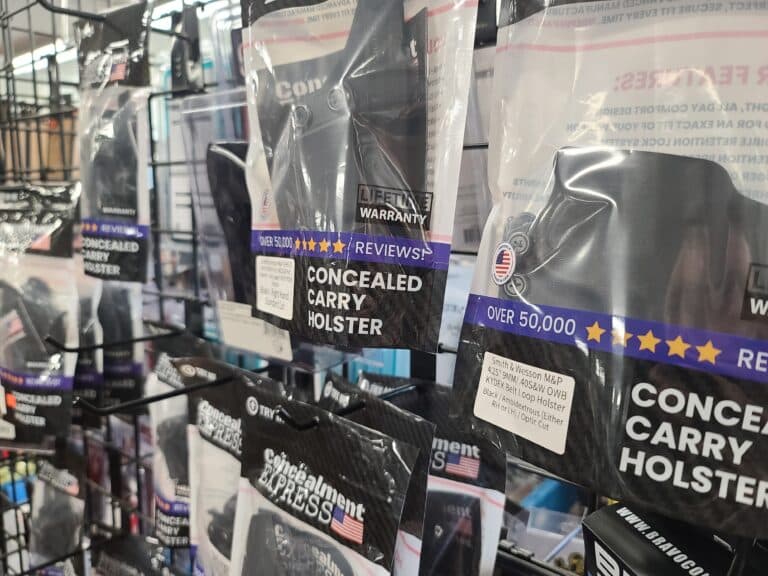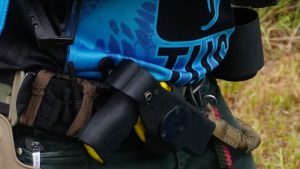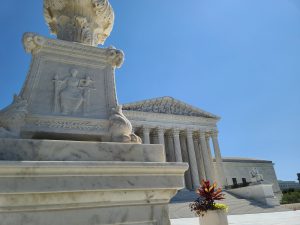Advocates are betting the Empire State’s new “sensitive places” restrictions will be sensitive to a legal challenge.
The Firearms Policy Coalition (FPC) and Second Amendment Foundation (SAF) filed suit against New York State Police Superintendent Kevin Bruen in federal court on Tuesday. The groups allege that enforcement of New York’s new carry restrictions amounts to “a de facto ban” on the right to bear arms in violation of recent Supreme Court precedent striking down the state’s previous carry law.
“S51001 replaced one unconstitutional licensing scheme with another, and worse, implemented expansive new criminal laws that ban carry of firearms in so-called ‘sensitive locations’ and presumptively on most property in the state—even for those who lawfully acquire and possess a license under the state’s onerous new licensing scheme,” the groups’ complaint reads.
The suit brings legal scrutiny right back to the state after it was rebuked by the Supreme Court less than three months ago. New York was the first state affected by the NYSRPA v. Bruen decision to pass a new law aimed at blunting protections for legal gun carry. A win in court for gun-rights advocates would once again check the state’s aggressive approach to gun control legislation and could serve as a deterrent to other states hoping to copy New York’s approach.
The state’s Concealed Carry Improvement Act (CCIA) was passed and signed into law on July 1 of this year, just days after the Bruen decision. Under the act, prospective licensees would have to pass lengthy state-approved training and demonstrate that they are of “good moral character” by, among other things, turning over all of their social media accounts for a background check from state officials.
Once licensed, the law would prohibit a person from carrying in dozens of public places around the state, such as government-owned buildings, educational institutions, health care facilities, places of worship, any place where alcohol is consumed, public transportation, and all of Times Square. It also makes all businesses presumptively off-limits and requires owners to post signs if they want to allow people to carry inside. A person caught carrying in one of these newly deemed “sensitive places” would be subject to a felony.
The Supreme Court addressed “sensitive places” restrictions in Bruen. The Court noted that such restrictions could pass constitutional muster, but only if they were limited in scope.
“[E]xpanding the category of ‘sensitive places’ simply to all places of public congregation that are not isolated from law enforcement defines the category of ‘sensitive places’ far too broadly,” Justice Clarence Thomas wrote for the majority. “Put simply, there is no historical basis for New York to effectively declare the island of Manhattan a ‘sensitive place’ simply because it is crowded and protected generally by the New York City Police Department.”
SAF Founder Alan Gottlieb said his group filed suit because the state’s litany of new restrictions makes a “mockery of the Supreme Court’s ruling.”
“While they’re playing politics, the rights of law-abiding New York citizens are being cavalierly trampled,” He said. “We cannot allow that to happen just so anti-gunners in Albany can play games with the constitution, just to see whether they can get away with it.”
Bill Sack, FPC Director of Legal Operations, called New York’s law a “hastily assembled wish list of gun control” ripe for a legal challenge.
“When single-party majorities enact poorly drafted, ill-conceived and unconstitutional legislation, FPC Law will step up and challenge them in the courts, as we have today in the Western District of New York,” he said.
However, the suit’s backers will be hoping to fare better in court than the last challenge from gun-rights advocates against the law. A previous lawsuit filed by Gun Owners of America was tossed just one day before New York’s law took effect after a federal judge determined that the group lacked standing.
Despite tossing the suit, the judge in that case noted that New York’s law was likely unconstitutional.
“While pursuing the laudable goal of public safety, and in an attempt to curb ever-increasing mass shootings, the New York State Legislature has generated an unconstitutional statute in the CCIA,” Judge Glenn Suddaby wrote. “In its eight-day haste to pass a legislative response to the Supreme Court’s Decision in NYSRPA, (which reads less like such a measured response than a wish list of exercise-inhibiting restrictions glued together by a severability clause in case some of the more fanciful restrictions were struck down), the New York State Legislature forgot four important words–’other than in self-defense.'”
Officials with the New York State Police did not respond to a request for comment.






